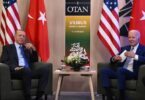ISLAMABAD (APP): The Supreme Court (SC) on Thursday termed the arrest of Pakistan Tehreek-e-Insaf (PTI) Chairman Imran Khan from the Islamabad High Court’s premises in the Al-Qadir Trust case unlawful and directed him to appear before the IHC on Friday (today).
Earlier in the day, the three-member SC bench comprising Chief Justice of Pakistan Umar Ata Bandial, Justice Muhammad Ali Mazhar and Justice Athar Minallah had ordered the National Accountability Bureau (NAB) to produce the PTI chairman before it within an hour.
At the outset of the hearing, the court ordered the police to keep Imran Khan at the Police Lines Guest House and also directed the Inspector General of Police Islamabad to ensure his security. The chief justice called the PTI chairman to the rostrum and said there had been incidents of violence after his arrest and the court wanted peace in the country.
He said when a person came to the court of law, it meant that he had surrendered himself before the court. Subsequently, the court termed PTI Chief Imran Khan’s arrest unlawful, asking him to approach the IHC on Friday.
Agencies Add: The top judge observed that the PTI chief was present in the IHC’s biometric courtroom on May 9. “When a person comes to the court of law, it means that he surrenders before the court.” The CJP said: “Twenty-three million people are waiting for the leader to sail this ship forward. You help with moving this ship forward.” “According to the Constitution, a person serving the nation is ameen (honest),” he remarked. “Your rival may not seem to be right, but they are a reality.”
The CJP asked that he expected the other party to play its role as well, stressing that “we are sure that you want the rule of law”. Justice Bandial also said that he was threatened and told to “wait for an attack” on him. Subsequently, the court ruled that Imran’s arrest was “illegal” and directed the PTI chief to approach the IHC. “You will have to accept the high court’s decision,” the top judge said, reiterating that Imran had to appear before IHC today (Friday). Justice Mazhar said that the SC would direct the high court to fix a hearing for 11am tomorrow, while the CJP stated that Attorney General for Pakistan (AGP) Mansoor Usman Awan would be the guarantor for security.
At that, the AGP said that he was told the Islamabad Police Lines had been declared a sub-jail. “Is he staying there in a bungalow or guest house?” Justice Mazhar asked, to which Islamabad IG replied that Imran had been kept at a guest house. “Are lawyers and others allowed to meet him?” Justice Bandial asked. The IG replied that he was unaware of that and only NAB could respond to the question. Here, the CJP stated that these matters would be decided by the court now and then asked Imran to provide a list of people he wanted to meet. “If someone wants to stay the night, we will give them permission.
“Ten people will stay with you … spend time with them and go to sleep,” he added. At one point, Imran appealed to the court to let him stay at his Banigala residence in Islamabad but the CJP told him that he was under the court’s supervision. “We don’t want you to be harmed,” Justice Bandial said, reiterating his directives for the government to ensure all the needed security arrangements for Imran. “The case will resume from where the matters became complicated,” the top judge remarked, adding that a written order will be issued soon.
At the outset of the hearing — which commenced a little after 2pm — one of Imran’s counsels, Hamid Khan, came to the rostrum and informed the apex court that his client had approached the Islamabad High Court (IHC) for pre-arrest bail. His lawyer said that Imran was in the process of getting his biometrics done when he was arrested. “Rangers misbehaved with Imran Khan and arrested him,” the lawyer said. CJP Bandial observed that court records showed that the case had not been fixed for hearing. The lawyer told the court that the appeal could not be filed without completing the biometric process.
Here, Justice Minallah observed that Imran had indeed entered the court premises. “How can anyone be denied the right to justice?” he asked. CJP Bandial said that there was a certain “respect” for the courts. Recalling a past incident, he said, “NAB had arrested a suspect from the Supreme Court’s parking [lot]. The court had then reversed the arrest.” The CJP asked Imran’s counsel about the number of Rangers personnel who had carried out the arrest of the former premier. Imran’s lawyer responded that “100 rangers personnel entered court premises” in order to arrest the PTI chief. “What dignity remains of the court if 90 people entered its premises? How can any individual be arrested from court premises?” he asked.
“In the past, action has been taken against lawyers for vandalism inside the court,” he observed. “If an individual has surrendered to the court, then what does arresting them mean?” He further said that NAB had committed “contempt of court”. “They should have taken permission from the court’s registrar before the arrest. Court staffers were also subjected to abuse,” he added. CJP Bandial emphasised that courts should be accessible to everyone for relief and that individuals should feel safe to approach the courts. Imran’s lawyer then demanded that his client be released from NAB custody, stating that the arrest was made without an investigation officer present.
The chief justice noted that the court was currently examining the manner in which the arrest was conducted and whether contempt had taken place. Imran’s lawyer then said that the PTI chief was on terrorists’ “radar”. Only after the arrest was made did it emerge that the warrant was issued on May 1, he said. Imran’s other lawyer, Advocate Salman Akram Raja, told the court that the interior ministry’s secretary had said he had not yet received the warrants for their execution. At this point, the CJP said that whatever had happened after Imran’s arrest should have stopped.
“This does not mean that we shut our eyes to an illegal action. Such a verdict should be given that applies to all. Access to justice is the right of every accused,” he said. “No one can be arrested from the Supreme Court, a high court or an accountability court,” the CJP said. Imran’s lawyer Hamid said that if that the party would not have approached the SC if the PTI chief had been arrested from outside his home or outside the court. Here, Justice Mazhar asked if Imran had responded to the NAB notice, to which the lawyer replied in the affirmative.
“According to the law, an arrest cannot be made when an inquiry is still being carried out,” Hamid said. Justice Minallah then said that NAB had arrested elected public representatives in a humiliating manner, adding that this needed to come to an end. “The act of surrendering to the court cannot be sabotaged,” he said. “The real issue is not of the NAB warrant but of the manner in which it was executed,” he said. “NAB talks about the implementation of the law but does not act upon it itself.” Justice Mazhar then noted that the NAB warrant had not been challenged and asked, “Why did Imran Khan not take part in the investigation?”
The PTI chief’s counsel said that the PTI chief had responded to the notice issued by the graft watchdog. At this point during the hearing, Justice Mazhar observed, “It is clear that Imran Khan did not act upon the NAB notice. A NAB notice means that the receiver will be considered a suspect. Many people obtain bail upon receiving a NAB notice.” “A March notice was responded to in May. Did Imran not violate the law?” he asked. At this, Imran’s counsel said that the PTI chairman had only received one notice. Justice Minallah then said that Justice Mazhar was talking about the implementation of the law, adding that the matter at hand concerned access to justice.
NAB Prosecutor General Asghar Haider said that the accountability bureau respected the country’s courts. But Justice Minallah said that NAB had “not learnt its lessons”. He observed that NAB had been accused of many things, including “political engineering”. “Had NAB taken permission from the registrar?” he asked, adding that a letter had been written to the interior ministry for the warrant’s execution. The NAB official responded to the judge’s queries by saying that he was not aware of the realities and had been posted at 1:30pm. Justice Minallah then said that a common citizen could also execute an arrest warrant. “Did NAB issue directives to arrest [Imran] from inside the court? How many notices were issued to Imran Khan?” he asked.
The prosecutor general responded by saying that only one notice had been issued to the PTI chief. “It appears that NAB’s warrant was not in accordance with the law. Was an attempt to arrest made after the warrant was issued?” Justice Minallah asked. CJP Bandial noted that the warrant was issued on May 1 and the arrest took place on May 9. “Why did NAB not try [to arrest Imran] itself for eight days? Did NAB want to arrest Imran from court? Why was a letter written to the interior ministry on May 8?” he asked. He also asked who had carried Imran’s arrest. The NAB official replied that according to the IHC order, the arrest was overseen by the police. Justice Minallah then asked why NAB didn’t write to the Punjab government regarding the warrant, observing that the bureau had contributed to the country’s destruction.
Attorney General of Pakistan (AGP) Mansoor Awan then appeared before the court at which the CJP remarked that they would hear his opinion on access to justice. The AGP said that what NAB had done with the ex-premier had “become a norm”. He asserted that NAB was an “independent institution”, adding that it had requested Rangers to be posted. He said, however, that NAB had requested Rangers to be present at the scene, not carry out the arrest. Justice Minallah observed that NAB had put all the blame on the federal government.
“If an accused surrenders before the court and is arrested, then the court will be an easy place to carry out arrests,” the CJP said. “In the mind of the accused, the courts will become a facilitator for making arrests. The courts are free, a free court means to provide protection to citizens,” he said. Justice Minallah remarked, “It is becoming difficult for you to defend. Other political parties have also been treated very badly. Every citizen is being affected by the recent arrest. Justice Minallah went on to say, “Would it not be appropriate to restore the public’s trust in the judiciary? Would it not be appropriate that the court decides on Imran’s bail petition?
“A lot has happened in the country. The time has come for the rule of law to be established. The arrest will have to be reversed from where it was made,” he added. Subsequently, the CJP said the court would issue an “appropriate order” today. He added that the court was “very serious” about the matter. Ahead of Imran’s arrival in SC, security was tightened outside the apex court, with contingents of the Rangers and police, and bomb disposal squads called in. Only lawyers and journalists already present in courtroom number 1 — where the hearing was held — are allowed inside the room. The media also reported that the Islamabad DIG (security) had reached the court to review the security situation. Meanwhile, the PTI asked its supporters to stay away from the top court.







